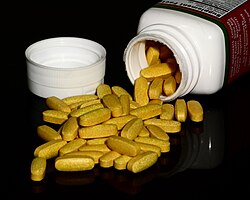Classification of nutraceuticals
Nutraceuticals are products derived from food sources that are purported to provide extra health benefits, in addition to the basic nutritional value found in foods. Depending on the jurisdiction, products may claim to prevent chronic diseases, improve health, delay the aging process, increase life expectancy, or support the structure or function of the body. [8]
Dietary supplements

In the United States, the Dietary Supplement Health and Education Act (DSHEA) of 1994 defined the term "dietary supplement": "A dietary supplement is a product taken by mouth that contains a 'dietary ingredient' intended to supplement the diet. The 'dietary ingredients' in these products may include: [9] vitamins, minerals, herbs or other botanicals, amino acids, and substances such as enzymes, organ tissues, glandulars, and metabolites. Dietary supplements can also be extracts or concentrates, and may be found in many forms such as tablets, capsules, softgels, gelcaps, liquids, or powders." [14]
Dietary supplements do not have to be approved by the FDA before marketing, but companies must register their manufacturing facilities with the FDA and follow current good manufacturing practices (cGMPs). [9] With a few well-defined exceptions, dietary supplements may only be marketed to support the structure or function of the body, and may not claim to treat a disease or condition, and must include a label that says: “These statements have not been evaluated by the Food and Drug Administration. This product is not intended to diagnose, treat, cure, or prevent any disease.” The exceptions are when the FDA has reviewed and approved a health claim. In those situations the FDA also stipulates the exact wording allowed. [9]
Functional foods

Functional foods are fortified or enriched during processing and then marketed as providing some benefit to consumers. Sometimes, additional complementary nutrients are added, such as vitamin D to milk.
Health Canada defines functional foods as "ordinary food that has components or ingredients added to give it a specific medical or physiological benefit, other than a purely nutritional effect." [15] In Japan, all functional foods must meet three established requirements: foods should be (1) present in their naturally occurring form, rather than a capsule, tablet, or powder; (2) consumed in the diet as often as daily; and (3) should regulate a biological process in hopes of preventing or controlling disease. [16]